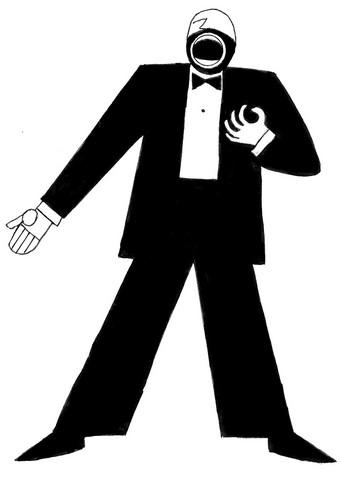Meeting the maestro
Through the marvels of modern technology yesterday I met John Eliot Gardiner. Well, not exactly, but I did take part in a video-conference that linked the maestro with students in London, Wales, Edinburgh and of course York. This is one of a series of video-conferences sponsored by the London Symphony Orchestra. It was a very interesting afternoon which focused largely on the problems of conducting and performing, particularly earlier repertoire. Gardiner talked about performing earlier music with modern instruments (okay, as long as the conductor and the players have a clear idea of how to approach the music and do not try to sound like early instruments). He said that his vision of the future for major orchestras is that they would have players that could double on period instruments and/or a core of players that could play earlier works. A large portion of the conversation centered around avant-garde staging of operas and also the Bach Passions and cantatas. Gardiner’s main view was that Bach’s music is inherently theatrical and could lend itself to the right kind of theatrical presentation, in which simplicity was paramount and the natural relationship between players and singers could be realized. He also argued that Mozart’s Le Nozze di Figaro and Cosi fan tutte are period pieces whose meanings become muddled with recontextualizion (i.e. Peter Sellars’ "Despina’s Diner"; he suggested that other Mozart operas could survive adventurous staging). He made an interesting link between these two operas and Jane Austen. One could argue that Pride and Prejudice would be ruined if moved to another setting, as would Cosi. He stressed that in Mozart’s operas many of the clues for the action on stage are found in the orchestration and underscoring. When the orchestra is somehow visible to the audience this link is emphasized. An interesting idea that I think I agree with, having seen a few operas where the orchestra was readily visible. Other issues addressed included a discussion on orchestral colours in Berlioz, the loss of unqiue sounds between orchestras and the development of the early music movement in Britain (My memory is a bit jumbled as I also attended a workshop on the ins and outs of tuning early music earlier in the day hosted by Hilliard Ensembler Rogers Covey-Crump...).
Overall I thought it was a stimulating afternoon and an idea that American orchestras should replicate (if they are not doing it already). Conductors are often very interesting, smart, well-spoken personalities and it certainly helps to see the human being behind the music. It made me think that orchestras could benefit from having brief interviews with conductors posted on their websites about upcoming programs. Think about it: you are going to hear Eschenbach and the Philly Orchestra play a Beethoven symphony on Friday. On Thursday night you go to the Orchestra’s website and watch a five minute interview with Eschenbach giving his insights on the piece and why he feels it is important. Maybe you could even watch a snippet of the orchestra rehearsing that very work so you could see how the sound was arrived at and who these orchestral musicians are when they’re not onstage in tuxes and dresses. You go to the concert on Friday with these things in mind and decide at intermission that you’d like a CD of the piece that was performed in the first half of the concert. You place an order, return to your seat for the second half of the concert and upon leaving are handed a pretty CD of what you just heard an hour before (Obviously this last bit was taken from Gardiner’s own recent recording innovation on his label Soli Deo Gloria. Regrettably I didn’t get a chance to ask him about it.) So basically, your symphony-going experience has been transformed from a one-off event to something that you have a lasting record of. And when you listen to that CD in the future, maybe you’ll see Eschenbach conducting and associate parts of the music with what he said in his pre-concert interview. We have the technology for this. It is easy and informative and creates a more dedicated listener. Why isn’t everybody doing this?




